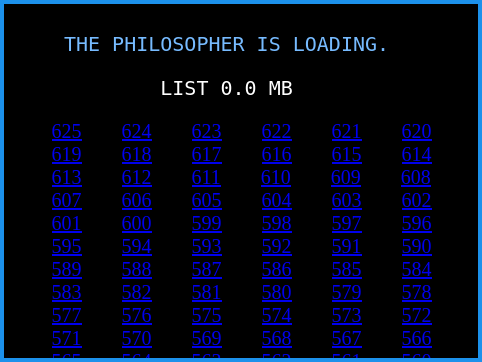

Taming Outlandish TiddlyWikis
A prototype for the time being.
I’m sorry to be very ‘projecty’ today—I will get back to linking and surfing straightway. But, first, I need to share a prototype that I’ve been working on.
Our friend h0p3[1] has now filled his personal, public TiddlyWiki to the brim—a whopping 21 MEGAbyte file full of, oh, words. Phrases. Dark-triadic memetic, for instance. And I’m not eager for him to abandon this wiki to another system—and I’m not sure he can.
So, I’ve fashioned a doorway.
This is not a permanent mirror yet. Please don’t link to it.
Yes, there is also an archive page. I took these from his Github repo, which appears to go all the way back to the beginning.
Ok, yes, so it does have one other feature: it works with the browser cache. This means that if you load snapshot #623 and then load #624, it will not reload the entire wiki all over again—just the changes. This is because they are both based on the same snapshot (which is #618, to be precise.) So—if you are reading over the course of a month, you should only load the snapshot once.
Snapshots are taken once the changes go beyond 2 MB—though this can be tuned, of course.
- Total size of the raw archive: 6.2 gigs.
- Size of my kicksnap’d archive: 736 megs.
Shrunk to 11% of its original size. This is done through the use of judicious diffs (or deltas). The code is in my TiddlyWiki-loader repository.
A Few Lessons I Picked Up
I picked up this project last week and kind of got sucked into it. I tried a number of approaches—both in snapshotting the thing and in loading the HTML.
I ended up with an IFRAME in the end. It was just so much faster to push a 21 MB string through IFRAME’s srcdoc property than to use stuff like innerHTML or parseHTML or all the other strategies.
Also: document.write (and document.open and document.close) seems immensely slow and unreliable. Perhaps I was doing it wrong? (You can look through the commit log on Github to find my old work.)
On the Snapshot Technique
I originally thought I’d settled on splitting the wiki up into ~200 pieces that would be updated with changes each time the wiki gets synchronized. I got a fair bit into the algorithm here (and, again, this can be seen in the commit log—the kicksplit.py script.)
But two-hundred chunks of 21 MB is still 10k per chunk. And usually a single day of edits would result in twenty chunks being updated. This meant a single snapshot would be two megs. In a few days, we’re up to eight megs.
Once I went back to diffs and saw that a single day usually only comprised 20-50k of changes (and that this stayed consistent over the entire life of h0p3’s wiki,) I was convinced. The use of diffs also made it very simple to add an archives page.
In addition, this will help with TiddlyWikis that are shared on the Dat network[2]. Right now, if you have a Dat with a TiddlyWiki in it, it will grow in size just like the 6 gig folder I talked about in the last box. If you use this script, you can be down to a reasonable size. (I also believe I can get this to work directly from TiddlyWiki from inside of Beaker.)
And, so, yeah, here is a dat link you can enjoy: dat://38c211…a3/
I think that’s all that I’ll discuss here, for further technical details (and how to actually use it), see the README. I just want to offer help to my friends out there that are doing this kind of work and encourage anyone else who might be worried that hosting a public TiddlyWiki might drain too much bandwidth.
philosopher.life, dontchakno? I’m not going to type it in for ya. ↩︎
The network used by the Beaker Browser, which is one of my tultywits. ↩︎



